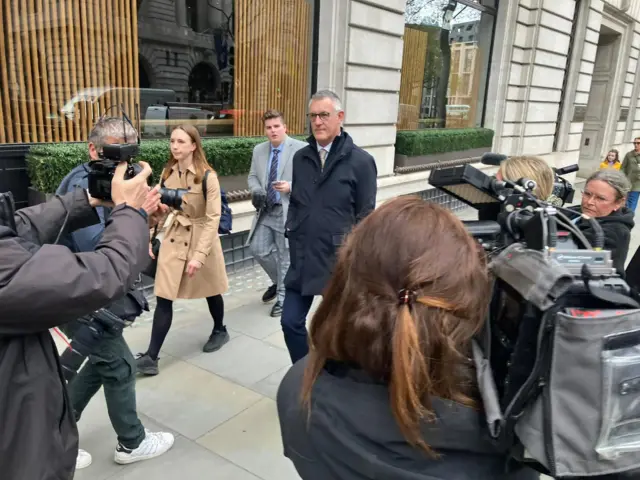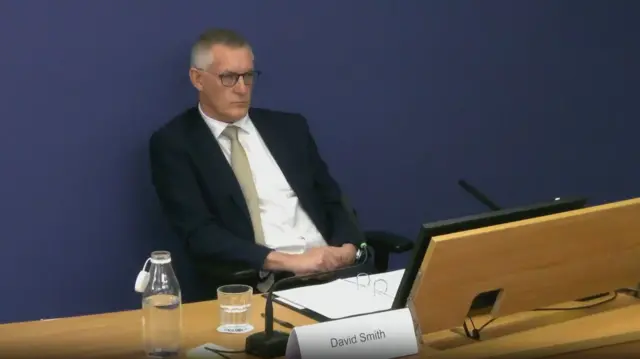Inquiry pauses for breakpublished at 15:32 BST 11 April 2024
The inquiry has paused for a short break.
We'll be wrapping up some of the latest lines from Aldwych House here, so stay with us.
Former Post Office chairman Sir Michael Hodgkinson has given evidence to the inquiry into the Horizon IT scandal
He apologised "unreservedly" and said he was "very very sorry" for the misery the Horizon software caused to sub-postmasters and mistresses
Earlier, former managing director David Smith apologised for a 2010 email saying a pregnant sub-postmistress's prison sentence was "brilliant news"
Seema Misra, from Surrey, was given a 15-month sentence in November 2010 - the conviction was quashed in 2021
"It was intended to be a congratulatory email to the team... I am hugely apologetic," Smith said
Smith also said the Post Office was focusing on restructuring in 2010, rather than the prosecutions of sub-postmasters
And he said he was told by Post Office executives Paula Vennells and Susan Creighton that Horizon was "pretty much tamper proof"
Between 1999 and 2015, more than 900 sub-postmasters were prosecuted due to the faulty Horizon IT system
Edited by Nadia Ragozhina and Robert Plummer
The inquiry has paused for a short break.
We'll be wrapping up some of the latest lines from Aldwych House here, so stay with us.
 Sean Seddon
Sean Seddon
Reporting from the inquiry
Hodgkinson is being asked about the case of Julie Kay - nee Wolstenholme - a former sub-postmistress whose life was turned upside down when her Post Office branch was shuttered in 2000.
Because of Horizon, she couldn't make her accounts balance and so her business was suspended by the Post Office.
It led to her staff being laid off and the breakdown of her family. She and her children ended up sleeping in a caravan in her parent’s garden.
In her witness statement, external to the inquiry, Kay said it meant her “future just disappeared”.
When the Post Office began civil proceedings in 2003 to recover what they said was missing money, Kay’s solicitor enlisted an IT expert who looked into Horizon and found the technology may well be faulty.
In the end, the Post Office settled out of court with Kay and paid her compensation, though she never got her business back.
Hodgkinson tells the inquiry he was not made aware of the settlement with Kay, and was never told about systemic Horizon issues while he was with the Post Office.
Sir Wyn Williams interjects to ask how such a "significant sum" of money could be paid out without the board being made aware. Hodgkinson says he should have been told but wasn't.
The inquiry looks at Horizon's next-generation business case, turning to a report which outlined that in situations where fraud had been perpetrated against the company, civil orders would be used in advance of criminal proceedings to help recovery efforts.
Hodgkinson is asked if at board meetings, chief operating officer David Miller ever raised concerns about Horizon's integrity, reliability or the impact or potential impact on prosecutions.
Hodgkinson says he never heard any serious concerns raised about Horizon's integrity.
Counsel is now questioning Hodgkinson about a board meeting where he expressed interest in learning more about the operation and capabilities of the Horizon system.
Hodgkinson says he can't recall who he met with, but that he assumes that the IT director at the time, Alan Barrie, set the meeting up. He says three to five people attended the meeting and went through their view of "what the future capabilities" of Horizon were.
He adds that he believes someone from Fujitsu was part of the group, but he has no way of proving that one way or another.
Hodgkinson also says Horizon was a "constant issue", because there were "constant requests for money", but says nobody ever raised any concerns about the system.
 Sean Seddon
Sean Seddon
Reporting from the inquiry
Sir Michael is being asked about very technical matters relating to the Post Office's internal management and oversight structures.
It is, to be blunt, not the most gripping evidence an inquiry has ever heard - but it is still revealing in parts.
In one answer, Sir Michael refers to sub-postmasters as "highly motivated businesses", which inquiry lawyer Julian Blake quickly picks up on.
Were sub-postmasters seen more as businesses than humans among Post Office managers, he asks.
Sir Michael says: "I think they were, probably."
The exchange gets to the heart of why this inquiry is happening in the first place. The Horizon scandal wasn't simply confined to the world of finance or technology - it turned into a human tragedy.
Blake is trying to drill down into why that happened without alarm bells going off at the top of the Post Office.
Sir Michael Hodgkinson says that as far as he is aware, feedback surveys for staff did not extend to sub-postmasters.
But he says he thought they were a "very important part of the overall package", saying they were going to be important in selling the financial services which they hoped would form the basis of future profitability, and they were crucial for supporting social obligations.
“I think they were a pretty important part of the business," he says.
However, getting feedback from them in the same way as they would for employees was not discussed, he says. They were seen as “highly motivated individual businesses", he adds, whereas the Post Office had a responsibility to motivate its own employees, saying morale was a challenge because of cuts.
Asked if sub-postmasters were seen as businesses rather than humans, he says: "I think they were probably, yeah."
Feedback to the board on Horizon came from the IT director and then finance director, says Sir Michael Hodgkinson, because "they were the main people behind the project".
When asked about the concerns, he says that he "was not made aware of any concerns around the Horizon system from the board of the Post Office".
Hodgkinson says that there was a gap in relation to the oversight of the Post Office legal department. "I think we had a subset in the Royal Mail legal department," he says.
When asked what the problem was with that, he answers: "It wasn't represented on its own right." He also says that he is aware of the problem now looking back, suggesting that he was not aware of it at the time.
Sir Michael Hodgkinson is answering questions about the company structure. His statement says the Post Office didn't have its own sub-committees, and instead were using the structures in place for the wider Royal Mail Holdings umbrella group.
Hodgkinson is asked if relying on committees at such a high level was "too high".
"Probably," he says, adding that is why he introduced a Post Office-specific risk and compliance committee.
Asked if special rules around governance should apply for a company involved in the prosecution of people, he says he thinks that is "fair comment".
Hodgkinson says that everybody within the Post Office leadership "thought Horizon data was accurate".
"There were many, many people in the chain that needed to be convinced" of any errors with the system, he says, citing layers of corporate governance.
But he admits that the board had oversight over the development of the Horizon systems, with constant reporting on proceedings coming in.
However, most of the feedback was on a "forward-looking basis," Hodgkinson says, as "there was a very strongly held view that Horizon was good".
 Sean Seddon
Sean Seddon
Reporting from the inquiry
Both witnesses we've heard from today have reflected on how the Post Office's ailing finances were a key focus for senior bosses in the early 2000s and into the 2010s.
David Smith said his "primary focus" when he led the Post Office was on "keeping the business afloat".
Hodgkinson is painting a similar picture here and talks about the big reforms the Post Office needed at the time to balance the books.
Inquiry lawyer Julian Blake puts it to Sir Michael that it might be considered strange that there was more focus on the finances of the Post Office, rather than on the criminal prosecutions it was carrying out against sub-postmasters at the time.
He concedes that's a "fair comment".
Sub-postmasters watching this might well wonder why Post Office bosses gave money issues their full attention while they had a scandal unfolding right under their noses.
Sir Michael Hodgkinson is now talking about the number of non-executive roles he held at the same time as his Post Office role.
In the last few minutes, the inquiry has heard about how much time he was spending on each job within a week.
Asked if he had enough time to dedicate to his Post Office role, he said he thought at the time that he did.
But would a full-time chairmanship have made a difference? He answers that "it could have possibly made a difference", then adds: "I can't say definitely."
He is asked what he would have done differently if he had been in the job full-time.
"Based on information that I had at the time, I would have spent more time on the joint venture companies for developing financial services," Hodgkinson answers.
"Because that was the key product, and that was where we had the troubles," and then he corrects himself, "the problems."
Sir Michael Hodgkinson tells the inquiry that the Post Office's main focus at the time of the Horizon issues was to work towards main reforms within the organisation.
He says that board members were focused on reducing the number of loss-making Crown office branches and to "generally reduce costs over the operation".
The traditional streams of revenue into the Post Office - such as TV licence payments and pension payments - "were dying", Hodgkinson adds. "It was absolutely vital that new services were brought in if there was to be any form of viable future."
"The directors had to constantly be looking at this for fear of overtrading and being vulnerable for creditors," he adds.
 Sean Seddon
Sean Seddon
Reporting from the inquiry
There's a telling moment early in this afternoon's hearing where Hodgkinson is asked to explain why he was dubbed a "non-executive" in his Post Office role.
His answer, in short, is "that was just how it was".
Throughout this inquiry, we've been hearing from a whole host of people with opaque corporate job titles - and often with a "lord" or "sir" thrown into the mix.
It sounds like a trivial observation, but the complexity of the senior management structures at the Post Office is an important part of this story.
To most people, the Post Office is a quaint High Street shop were you can send parcels or pay in money. Behind the scenes, it is an enormous organisation split into several moving parts, operating at an arm's length but not entirely independently of the government and with an array of senior managers.
This cast of anonymous, obscurely-titled bosses are now in the spotlight. Now it's Hodgkinson's turn.
 Sean Seddon
Sean Seddon
Reporting from the inquiry

Smith has just left Aldwych House, where about a dozen cameras were waiting for him.
We attempted to ask him a question, whether he should have apologised earlier, but he doesn’t say a word.
As he left the building, he headed right, pursued by a throng of journalists.
It’s worth noting that he didn’t head left - that would have taken him straight past a branch of the Post Office.
I suspect that would have made the photographers here very happy indeed.
Hodgkinson is explaining the structure of the Royal Mail Holdings and the Post Office’s place in it. He confirms his time as a senior non-executive director of the former and chairman of the latter.
He confirms he had some oversight of the whole group. The Post Office was much smaller than the wider Royal Mail company, but was still a “significant part” of the business he says.
He says at that time the Post Office was loss-making and so they wanted to devise a strategy that was more financially viable.
The inquiry has resumed and the second witness of the day, Sir Michael Hodgkinson, head of the Post Office between May 2003 and August 2007, is taking questions.
During his time in charge, he was involved in discussions about extending Fujitsu’s contract - which was due to run until 2010 - at a lower price point.
Earlier in the inquiry, meeting notes for the company’s Risk and Compliance Committee were shared, which Hodgkinson attended.
Someone else who attended those meetings - Rod Ismay - told the inquiry that they would discuss individual investigations involving sub-postmasters and lessons learned from them.
After leaving Post Office Limited, he held a number of other roles - including as vice-chairman of TUI group, and a director for Crossrail Limited.
Before the lunch break, David Smith told the Post Office inquiry that "in hindsight it's sad" that the inherent risk of prosecution or compliance issues were not identified from Post Office Ltd prosecuting cases.
Asked what extent he accepts responsibility for not accepting those risks, he says: "I think I am a part of it."
Smith gives evidence at the Post Office enquiry
If you're not content to follow these proceedings via our coverage - and we can't imagine why you wouldn't be - then you are entitled to a ringside seat.
This is a public inquiry - and that means members of the public are entitled to come in and watch.
On some days, it's been standing room only - Alan Bates's appearance was apparently a big draw - but it's fair to say it's not exactly a sell-out today.
There are only a handful of people here today listening to proceedings, but many sub-postmasters with a real stake in this inquiry have been in attendance throughout.
 Image source, Post Office inquiry
Image source, Post Office inquiryWe've been hearing evidence from David Smith, who was managing director of the Post Office from April to October 2010.
Here's a recap of some of the key developments so far:
Stay with us for more.
 Sean Seddon
Sean Seddon
Reporting from the inquiry
The hearing then moved on to a slightly more complicated section, where representatives of other interested parties were invited to ask Smith questions.
There was a question from a lawyer representing five former Post Office branch managers, including Lee Castleton and Seema Misra.
She told the inquiry she intended to ask if the Ismay report was a "cover-up".
That led to quite a long legal discussion. It was explained to Smith that he was not required to answer questions if it could be self-incriminating and that he could discuss it with his solicitor if he wished to.
Smith said he would take on the question of whether Ismay was a cover-up, and says: "No, absolutely not."